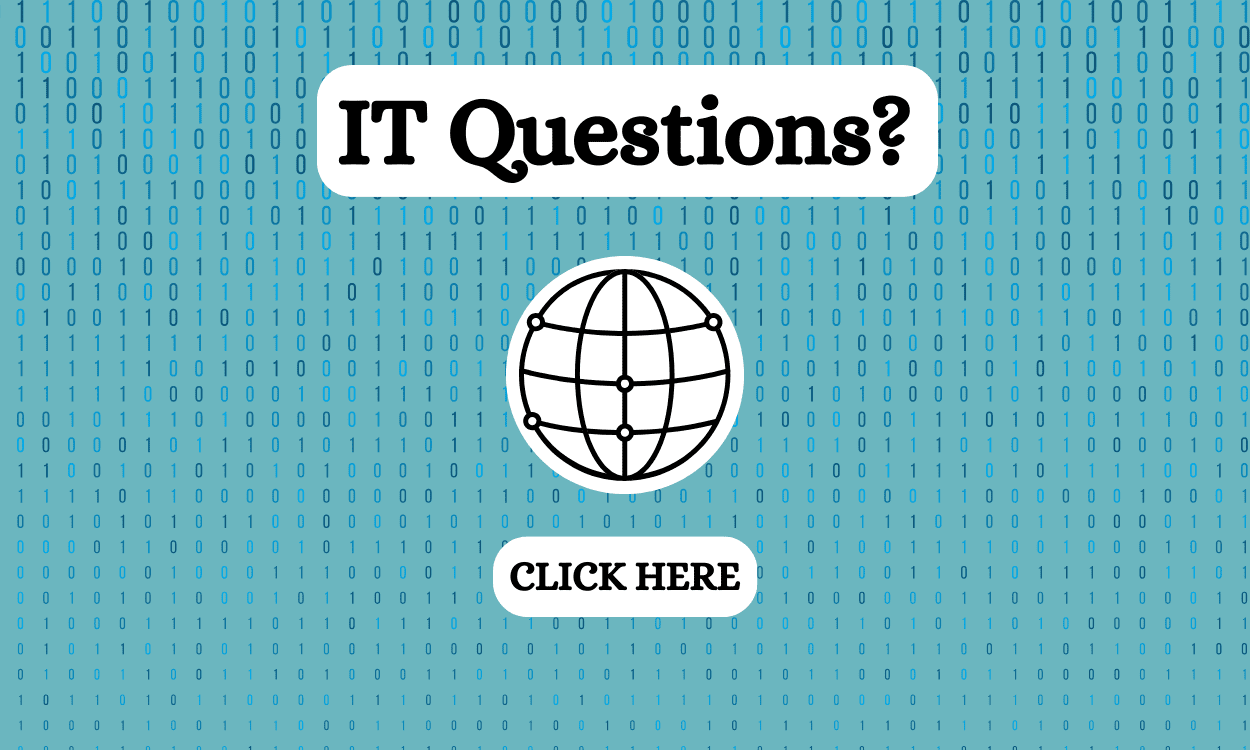
- Home
- Cybersecurity Tips
- Dissecting the Work of a Fractional CISO
Navigating through the complexities of cybersecurity is an immersive task that requires expertise, dedication, and an understanding of both strategic and tactical aspects. Shouldering this responsibility in-house can prove challenging for many organizations. But what if you could utilize top-notch IT security prowess on a part-time basis? Enter the role of a fractional CISO – a game-changer in modern cybersecurity strategies. Grab your favorite beverage as we embark on discovering what makes a fractional CISO tick.
Table of Contents
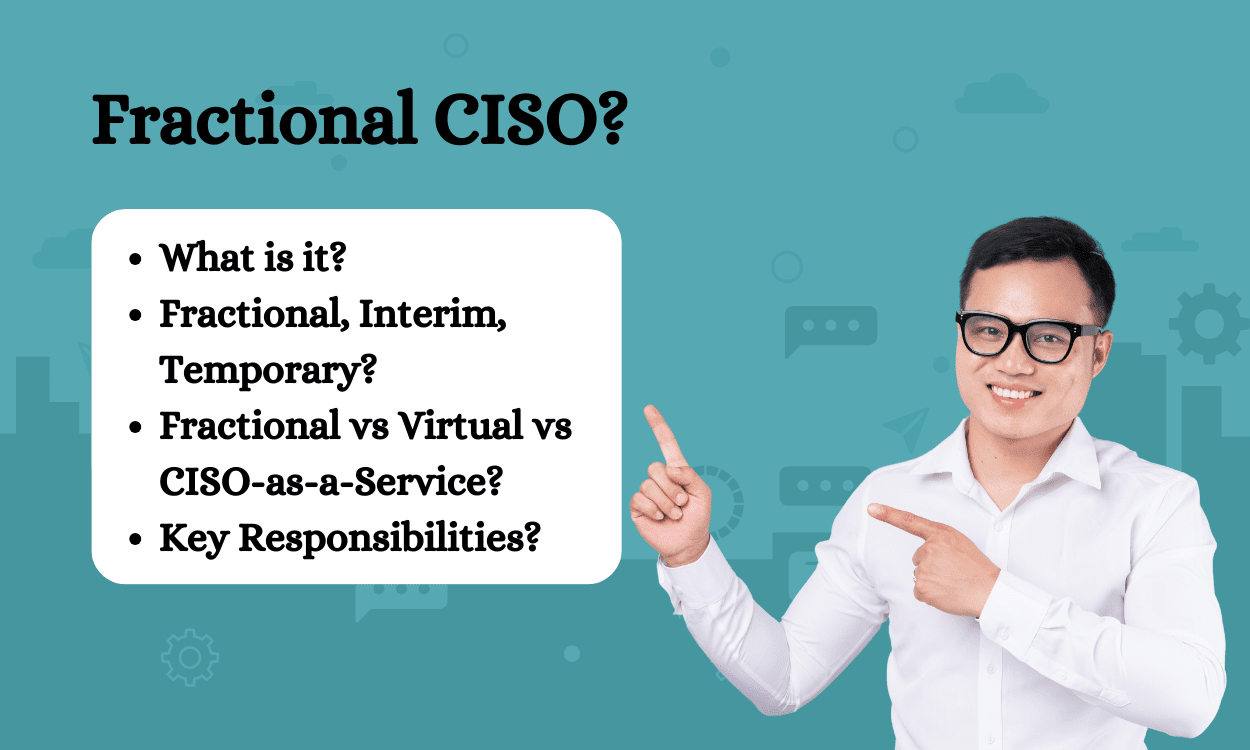
What is a Fractional CISO
A ‘Fractional’ Chief Information Security Officer (CISO) represents a part-time executive who offers specialized cyber risk management services to organizations. Despite their part-time status, they are deeply integrated into the organization’s management structure and play a vital role in shaping its overall security apparatus.
These tech-savvy professionals come with rich experience in handling myriad cybersecurity challenges across different industries. From weaving long-term strategies to managing budgets, implementing compliance requirements, conducting vendor assessments, to creating security awareness programs—they have one foot firmly planted in all areas of organizational cybersecurity practices.
The beauty of engaging these experts revolves around flexibility; they provide high-level security insights without being full-time employees—effectively streamlining costs while maintaining robust defenses against cyber threats.
Organizations usually enlist their expertise when they lack sufficient internal resources or require specialist skills that aren’t readily available within their existing teams. Already wondering how different this role is from similar ones like Interim or Temporary CISOs or intrigued about the comparison between fractional CISO vs Virtual CISO? Not to worry – our deep-dive exploration continues!
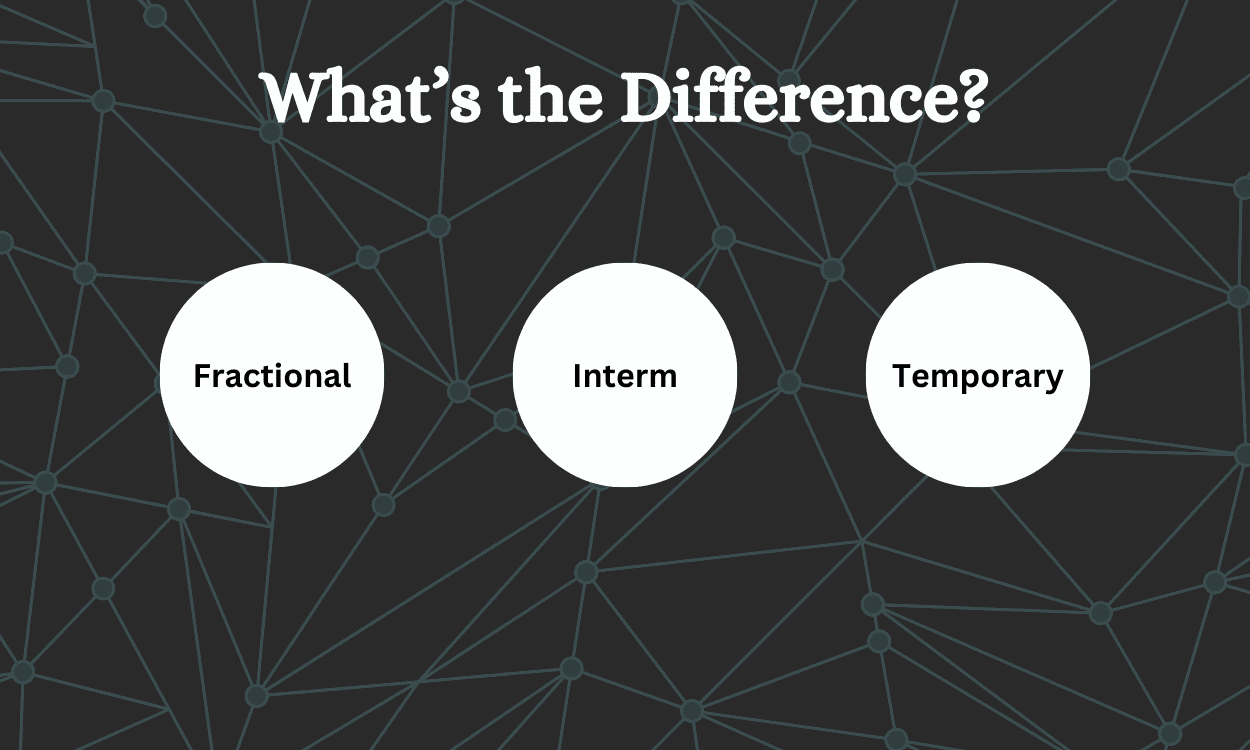
Fractional, Interim, Temporary CISO???
One of the questions that often arises in cybersecurity is this: What’s the essential difference between a fractional CISO, an interim CISO, and a temporary CISO? It’s understandable if these titles seem interchangeable from afar but they each serve distinct purposes within their realm.
Fractional
A fractional CISO offers organizations strategic security activities without the full-time commitment. Typically serving on a part-time basis, the role prioritizes strategy oversights like risk assessments, compliance management, and implementing cybersecurity measures to combat information threats.
Interim
The interim CISO, on the other hand, steps into an organization during transitions. They provide immediate leadership while mitigating risks until another permanent CISO is appointed. Similarly to a Fractional CISO, they may also conduct thorough audits to understand the current state of cybersecurity affairs within an organization. However, their main focus leans heavily toward keeping things stable during transitional periods.
Temporary
Finally, we have temporary CISOs who are short-term contractual employees offering specialist services for specific projects or defined durations. Similar to Interim CISOs, they fill vacancies but often work towards achieving organizations’ individual project goals.
In conclusion,
- The fractional CISO brings crucial long-term consistency.
- An interim CISO provides stability during company changes.
- A temporary CISO delivers specialized expertise for project specifics.
Understanding these differences can help businesses identify what sort of top-level cyber-security expertise they need in their corner at any given time.
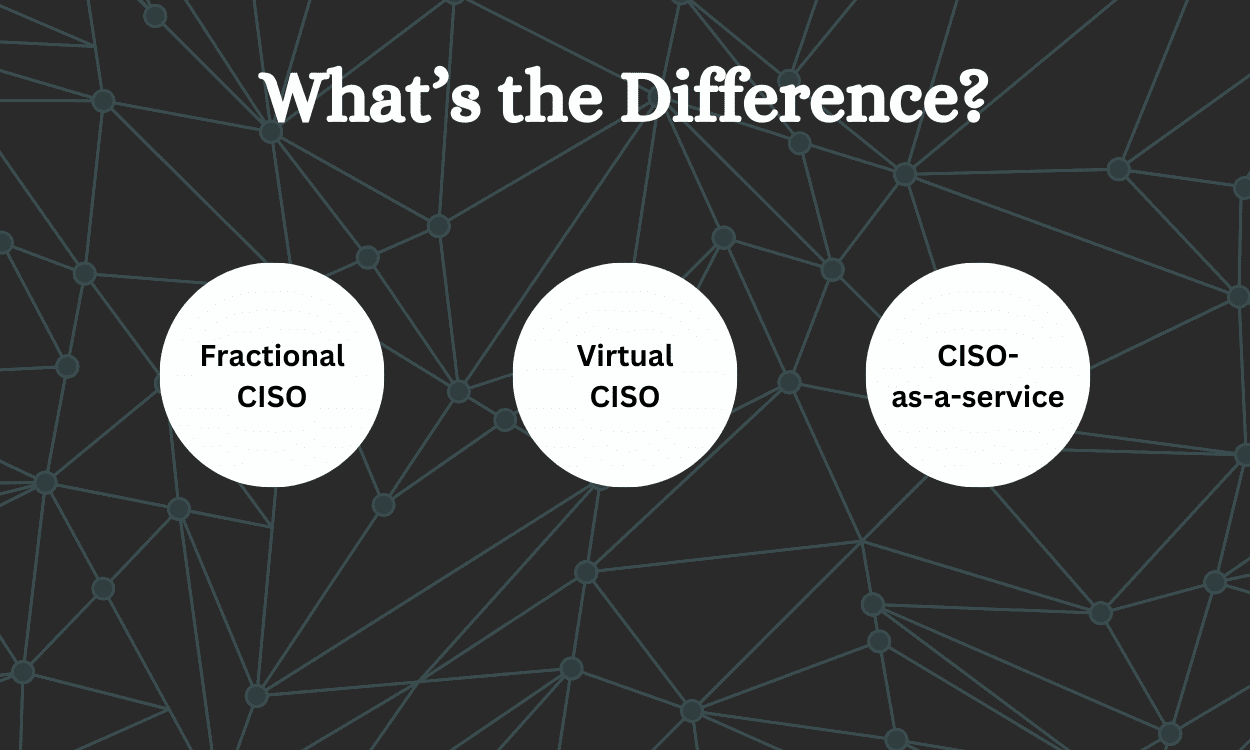
What’s the Difference Between Fractional CISO, virtual CISO (vCISO), and CISO-as-a-Service?
As we delve deeper into the world of cybersecurity, it’s essential to understand that not all roles are created equal. A fractional CISO, a virtual CISO (vCISO), and a CISO-as-a-service each carry unique characteristics catering to different organizational needs.
Fractional CISO
A Fractional CISO is a part-time resource who steps in to assume the role of a full-time Chief Information Security Officer (CISO), ideally suited for organizations lacking necessary budget or for companies who don’t need a full-time executive. Distinguished by their in-person presence, fractional CISOs attend critical meetings, engage with stakeholders directly, and possess nuanced visibility on-site. Still, they function only as a fraction of time compared to their full-time counterparts.
Virtual CISO
Contrarily, a Virtual CISO or vCISO are higher-level strategic consultants typically offered through IT consulting services or managed security service providers (MSSPs). They work remotely and may provide support to multiple businesses simultaneously. As remote executives working proactively using digital platforms, vCISOs ensure their client business stays secure while also educating staff about evolving cyber threats. Challenges with vCISOs in MSSPs are that they may just be a heavily technical resource and may not have led or implemented a security program before. It’s essential to work with a reputable expert in the business side of Cyber rather than someone who is really good at security technology.
CISO-as-a-service
Finally comes the concept of CISO-as-a-service, an innovative solution embraced by forward-leaning enterprises today. Just like SaaS (Software as a Service) model where software is licensed on a subscription basis, these services provide comprehensive security solutions under one package including policy controls infrastructure assessment etc., virtually dialed-in when required saving overhead costs significantly.
So while both fractional CISO vs vCISO positions share similar responsibilities such as developing and implementing security strategies or compliance oversight–key differences lie within the operational approach: fractional being more physically present while vCISO operates predominantly remotely. In contrast with these two models’ on-demand nature–the comprehensive coverage brought by Managed Security Services Providers(MSSP) providing ‘CISO-as-a-service’ deftly blurs boundaries leading cybersecurity landscape today.
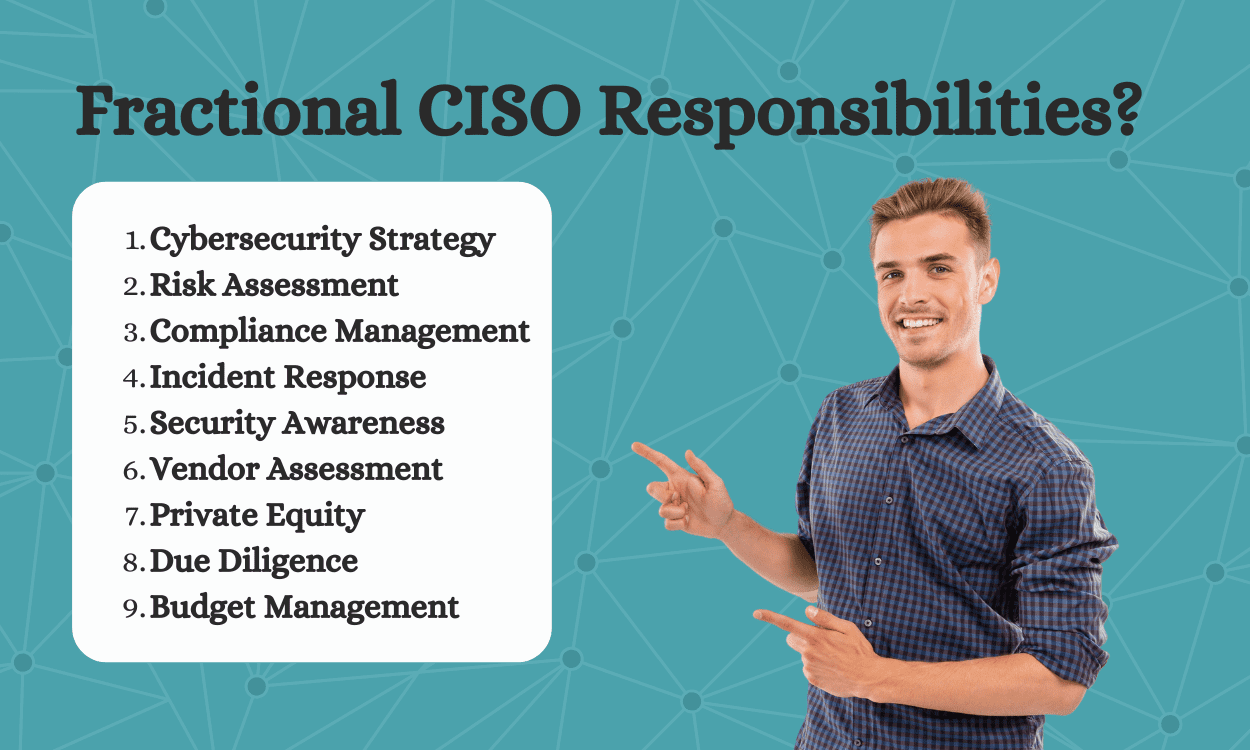
9 Fractional CISO Key Responsibilities
As a cybersecurity leader, the fractional CISO is charged with multiple responsibilities that ensure an organization’s data and systems are secure. Let’s delve into the key responsibilities you should be aware of.
1. Cybersecurity Strategy
Under this primary duty, a fractional CISO establishes and oversees the implementation of a comprehensive cybersecurity program, including risk management. This includes developing protocols for managing data access and identifying potential risks. It also involves ensuring alignment between business objectives and security measures to enhance overall governance while facilitating operational agility.
2. Risk Assessment
In dealing with risk assessment, it is essential to note that there always lies an imminent threat in today’s digital space. Therefore, as part of their critical duties, they carry out regular system audits – oh yes, no server or database entry goes unchecked! They meticulously identify vulnerabilities and suggest necessary remediations – such activities are crucial to preventing cyber-attacks before they occur.
3. Compliance Management
Overseeing compliance management is another vital aspect of what does a fractional CISO do?. Part of this responsibility entails understanding various regulatory standards like GDPR, HIPAA, PCI-DSS among others relevant to your industry. Additionally, the fractional CISO ensures adherence to these standards by continually reviewing policies and practices against established benchmarks.
4. Incident Response
Coming up next – incident response! Under this role, your fractional CISO will develop strategies to timely respond whenever there’s a security breach; such frameworks typically include identification parameters for unusual activities or threats within the system, which helps preemptively detect incipient issues not forgetting guidelines on subsequent actions post detection for swift recovery and minimal downtime.
5. Security Awareness
Training staff on proper cyber hygiene comes under the jurisdiction of a Fractional CISO too. From preaching strong password practices (e.g., using tools like 1Password) to instilling an understanding about phishing emails: expect him/her to rein in all ways possible concerning employee education for maintaining robust security awareness culture!
6. Vendor Assessment
Vendor assessments help prevent third-party liabilities which might inadvertently expose your organization’s sensitive information. A seasoned professional such as the fractional CISO conducts these checks – exploring aspects like vendor privacy policies or procedures against breaches via due diligence reviews or routine audits.
7. Private Equity
The security expertise plays a critical role in mitigating risks and providing valuable consulting support to portfolio companies, especially in today’s regulatory landscape (e.g., CCPA, GDPR). By establishing a common set of standards and implementing a robust security program, costs can be optimized and a strong commitment to safeguarding data (through Duty of Care) and assets can be demonstrated. By getting in front of potential digital risk or regulatory and compliance challenges, it helps improve the overall operating posture of the business.
8. Due Diligence
Having a cybersecurity expert on retainer is a benefit for those looking to do some M&A or for PE firms, especially those doing corporate or asset deals. The last thing a deal needs is to walk into a data and compliance and regulatory dumpster fire, only to have that fire continue to burn after close without a plan to remediate. Publicly traded companies especially have to be concerned with the new SEC rules becoming live in December, 2023.
9. Budget Management
Last but certainly not least – budgeting! Working closely with IT department heads and finance teams forms part of their ordinarily challenging workday schedule: assessing required investments versus available resources can be quite the bustling task indeed.. In brief: balancing reliable protection through adequate spend without hemorrhaging unnecessary funds falls right under their domain.
Each fractionated role gives light to what our hero —the “Fractional CIOs”— has embarked upon: No day is ever typical nor any solved problem exactly identical… So if every pixel counts towards getting him painted alive in your mind canvas: then surely each subtitle here adds its own unique hue indeed!

4 Benefits of Hiring a Fractional CISO
When it comes to managing information security risks, employing a fractional CISO service often offers superior results. This approach confers several unique advantages that can significantly enhance your organization’s resilience in today’s dynamic threat landscape.
1. Cost-Effective Solution
One of the primary benefits you’ll immediately notice when hiring a fractional CISO is cost-effectiveness. Operating in this capacity allows them to cater to multiple firms concurrently; thus considerably reducing the expense compared to employing a full-time CISO.
Setting up an entire cybersecurity team or department from scratch would not only be time-consuming but would also require extensive capital investment for recruitment, training and equipment—expenses that many small businesses can’t afford.
2. Specialized Expertise
The cybersecurity arena is technical, intricate and subject to continuous evolution. Staying abreast of emerging threats is challenging even for seasoned professionals. By engaging a Fractional CISO service, you gain access to specialized expertise grounded on vast experience across different industries and landscapes.
These experts come with unique proficiency in various cybersecurity aspects such as data protection regulations, risk assessments, security operations management, among others. Consequently, their specialized knowledge refines your cyber defenses and enhances your organization’s ability to predict, prevent and respond effectively to cyber threats.
3. Flexibility
A cogent advantage ancillary to hiring a fractional CISO is the built-in flexibility they provide your business model. Your needs will inherently fluctuate depending on market conditions or build pace if yours is a start-up technological company.
This kind of CISO provides custom services tailored explicitly around your organization’s needs—they modulate their responsibilities or hours based on what you need at the moment—a luxury typically absent while working with regular full-time staff members.
4. Enhanced Security
Lastly—and perhaps most crucially—by opting for fractional CISO services you witness enhanced security for your firm’s digital assets. Full-time availability means they’re perpetually focused on identifying vulnerabilities within systems and mitigating potential threats before they materialize into significant issues—an invaluable benefit considering the astounding increase in cyber threats we see nowadays.
In essence, all these benefits culminate into fortifying your organizational defense against debilitating cyber attacks preserving resources whilst simultaneously ensuring the optimal functioning of your business activities unhindered by lurking digital thieves.
Why Hire Fractional CISO Services from Class IV?
You might be wondering, why should I consider hiring Fractional CISO services from a firm like Class IV? The answer is simple yet multifold. Let’s shed some light on the key advantages that set this company apart and underline its value proposition.
Proven Expertise
Firstly, the seasoned cybersecurity leaders at Class IV bring vast expertise as fractional CISOs to your table. Their hands-on industry experience combined with innovative methodologies allows them to adeptly handle various security environments. Utilizing their knowledge and depth of experience, they can enhance the state of your organization’s cybersecurity framework effectively.
Personalized Approach
At Class IV, one of the main priorities is tailoring solutions to meet unique business needs. Each entity faces distinct challenges in terms of information security; therefore, it’s vital for your chosen fractional CISO to adopt a personalized approach, which is precisely what you get with Class IV.
Timely and Efficient
In today’s rapidly evolving digital landscape, proactiveness is essential. With an array of threats looming about constantly, waiting could spell disaster. Fortunately, engaging with a fractional CISO from Class IV ensures prompt action without compromising quality or effectiveness.
Advanced Cybersecurity Resources
Class IV provides access to highly sophisticated resources and tools that other firms may not possess or cannot afford. By leveraging these advanced tech resources, coupled with their specialized expertise in cybersecurity strategy and risk assessment as previously discussed, they can cost-effectively bolster the overall security posture of any business.
To summarize, when it comes down to why you should enlist the services of a fractional CISO from Class IV – it ties back to their clear understanding of cybersecurity’s complexities and the value derived from superior service delivery. Remember that outsourcing such crucial responsibilities isn’t solely about cutting costs; it’s also about gaining insights from acknowledged experts who dedicate themselves to safeguarding businesses against cyber threats – essentially what you’re signing up for with Class IV.


